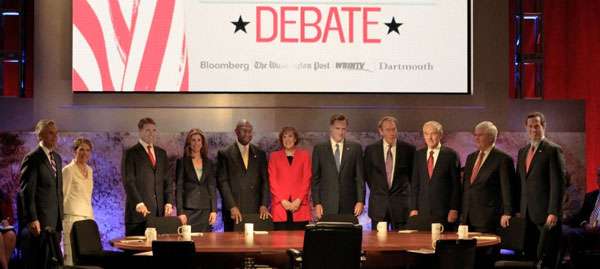 Last night’s GOP presidential debate said nearly as much about the folks asking the questions as those answering them. One of the opening questions, lobbed by Washington Post political reporter Karen Tumulty, was about as baited as they come. She expressed surprise that Wall Street executives hadn’t been carted off to jail for, in her opinion, causing the financial crisis. She then asked the eight Republicans if they thought these executives should, in fact, go to jail.
Last night’s GOP presidential debate said nearly as much about the folks asking the questions as those answering them. One of the opening questions, lobbed by Washington Post political reporter Karen Tumulty, was about as baited as they come. She expressed surprise that Wall Street executives hadn’t been carted off to jail for, in her opinion, causing the financial crisis. She then asked the eight Republicans if they thought these executives should, in fact, go to jail.
Ms. Tumulty was attempting to set-up a scenario wherein the candidates would incriminate themselves as being elitist (if they flatly said no) or class warfare instigators (if they said yes), which is blatantly unfair. Her question carried with it the premise that the private sector, not big government intervention, is the culprit of capitalism.
While all the candidates who answered the question properly pointed-out that government policies, more than the private sector decisions, were the cause of the financial crisis, only Newt Gingrich went for the knock out. The former Speaker knocked Ms. Tumulty’s curve ball right out of the park by asserting that Chris Dodd and Barney Frank were the ones that needed to go to jail.
In naming Senator Dodd and Congressman Frank, Gingrich won on two fronts: 1.) he dispatched with the notion that corporate execs should be punished for bad public policy and 2.) he highlighted the corruption and cronyism of the authors of the Dodd-Frank Financial Reform Act, which is devastating the nation’s financial sector. Senator Dodd has been plagued for years for his dirty insider deals with Countrywide Financial, once one of America’s largest mortgage companies.
Documents revealed in 2008 that Dodd and other senior Congressional and White House officials, friendly to Federal housing programs, received sweetheart mortgage deals to refinance personal properties. Memorandums obtained at the time indicate that the management of Countrywide offered these deals to government officials deemed “F.O.A,” which stood for “Friends of Angelo,” referring to Countrywide chief executive Angelo Mozilo. Additionally, Congressman Frank has been under a great degree of scrutiny in recent years for his cozy financial and political relationship with mortgage giant Fannie Mae, while advocating for increased Federal subsidies for the housing industry. Those kinds of insider trades propped up the mortgage giants that created the housing bubble with taxpayer funds. Federal fiscal and financial policies, more than the actions of anyone in the private sector acting without government intrusion, are responsible for the financial calamity that currently grips this country.
The question posed by Karen Tumulty last evening was intended to be a “gotcha” scenario, but it turned-out to be one of the defining moments of the debate. It provided the opportunity for conservatives, namely Gingrich in this case, to clearly point out the misguided nature of the “Occupy Wall Street” protests, and the constant pontifications of the President and senior Democratic officials that business owners and executives should be held responsible for the current financial condition of the country. When I watch the very people responsible for policies that have pillaged the private sector, and the pockets of all Americans, blame the private sector, I’m disgusted. It truly reaffirms my assertion that politicians too often adhere to the philosophy “it’s not whether you win or lose; it’s how you place the blame.”





I still believe that government should not be in the business of creating jobs, the private sector does a much better job.
And the banks hard to bevleie in a time when we’re facing a banking crisis that many of the banks created are still the most powerful lobby on Capitol Hill. And they frankly own the place. Doesn’t sound like myth to me.